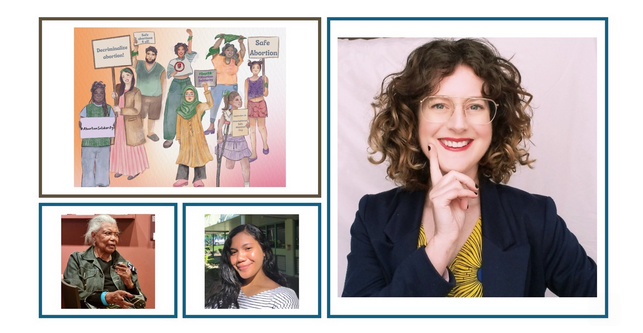Alas! it is not for 45% of women who are not empowered to make choices over their healthcare and contraception needs and choices. Nearly half of the women in 57 developing countries are denied the right to decide whether to have sex with their partners, use contraception or seek healthcare, according to UNFPA’s State of World Population Report. This lack of bodily autonomy- the right to make free and informed decisions about one’s own body, without coercion or violence- has serious implications for the health and wellbeing of women and girls.
We see violations of bodily autonomy when a lack of choice and decision-making leads to unplanned pregnancy, or to unsafe abortion that is a leading, yet totally preventable, cause of maternal mortality and morbidity. As per data, around 73 million induced abortions take place globally each year (majority of which are in the 21-34 age group). 61% of all unplanned pregnancies, and 30% of all pregnancies (planned and unplanned), end in induced abortion. However, around 45% of these abortions are unsafe. More than half of all these unsafe abortions occurred in Asia. In Latin America and Africa, nearly 75% of all abortions were unsafe. The South East Asia region experiences an estimated 3.6 million unsafe abortions annually.
An estimated 29,000 pregnant women and girls die from unsafe abortion and 7 million are injured or disabled due to unsafe abortion worldwide every year. And this is despite abortion being a common health intervention, which is very safe when carried out using a method recommended by WHO, appropriate to the pregnancy duration and by someone with the necessary skills.
“Deaths due to unsafe abortion are entirely preventable. It is lack of access to safe, timely, affordable and respectful abortion care that leads to these preventable maternal deaths,” laments Melissa Cockroft, Global lead for abortion at the International Planned Parenthood Federation (IPPF).
Although the legal status of abortion varies considerably by region, most countries permit abortion under at least some circumstances. Globally there are 22 countries where abortion is completely illegal or prohibited. However, since 1994, nearly 60 countries across the world have liberalized their abortion laws to expand the grounds under which abortion is legal.
Under its Medical Termination Pregnancy Act, abortion has been legal in India under certain specific circumstances since 1971. However, amendment to the Act made by the Supreme Court in 2022, has extended abortion rights to single and unmarried women, and has included marital rape under the Medical Termination Pregnancy Act. As the law stands now, it allows certain categories of women — including single unmarried women, married women who were divorced or widowed, minors, rape victims or mentally ill women — to obtain abortions up to 24 weeks into their pregnancies.
According to Cockroft, “Legal status of abortion does not always predict that an abortion will be safe or unsafe. However legal restrictions are known to be more likely to lead to unsafe abortions. Restricting abortion by law does not prevent or reduce abortions but keeps them unsafe. When pregnant people want an abortion they will find a means to obtain it, even if it is unsafe. Abortion rates in countries which legally restrict abortion are actually higher than those where abortion is available on request. At the same time, in countries where abortion is less restricted under the law, many people may still struggle to access safe abortions due to lack of accessible and affordable clinical services.”
For example, despite progressive legislation for access to abortion services, India continues to have unsafe abortions. According to a study an estimated 77% of unplanned pregnancies end in abortion in India, and only 22% of these abortions were considered safe. Nearly eight women die each day due to causes related to unsafe abortion in the country.
Jessica Work, Youth Networker for the Pacific at the International Planned Parenthood Federation (IPPF) for East and South-East Asia and Oceania Region, calls for decriminalising safe abortion and make it accessible to all in a rights-based manner by using a human-rights lens and not a religious lens.
She stresses upon the need to engage young people in decision-making about policies that impact their lives, so that future generations have a choice envisioning a world where we break the shackles of stigma around abortion through unity, intersectionality and intergenerational mentoring.
All countries have committed to achieve the Sustainable Development Goals (SDGs), two of which are specifically related to addressing unsafe abortion. SDG-3 and SDG-5 advocate for removing barriers to unsafe abortion as key objectives for achieving universal access to sexual and reproductive health, reducing maternal mortality and promotion of gender equality. No woman should be forced to continue a pregnancy against her will, or face life, health, or legal risks as a result of having an abortion.
Celebrated every year on September 28, the International Safe Abortion Day is a global day of action to demand access to safe and legal abortions everywhere and for all women, girls, and gender-diverse individuals. This year’s theme focuses on solidarity and collective efforts of diverse, intergenerational, and cross-border communities for advancing the right to reproductive justice.
Virginia Allen is a 93 year old person living in Seaview Hospital facility who served as a nurse (often referred to as Black Angels) in Staten Island, US. Virginia says abortion rights are healthcare rights. She calls for ensuring that every girl and woman has full access to entire cascade of healthcare services required for maternal health and overall health and wellbeing.

 Virginia says abortion rights are healthcare rights. She calls for ensuring that every girl and woman has full access to entire cascade of healthcare services required for maternal health and overall health and wellbeing.
Virginia says abortion rights are healthcare rights. She calls for ensuring that every girl and woman has full access to entire cascade of healthcare services required for maternal health and overall health and wellbeing.










.jpeg)



.jpg)





.jpeg)

.jpg)





.png)

